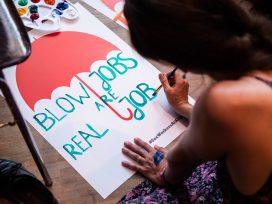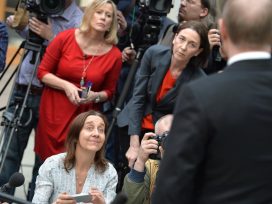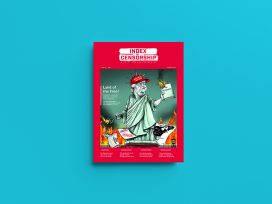The BBC bounces back
In the months before the corona pandemic, the BBC had been battling for its political survival under a constant barrage of criticism. Then, as the crisis hit and ratings for news services rose, the government’s anti-BBC rhetoric started to disappear. Has the emergency changed attitudes to the broadcaster?
As I write this at the beginning of April 2020, the BBC has launched a new set of educational programmes to help parents home schooling their children during the pandemic and its arrival is being lauded by government ministers.
One of them is the UK Culture Secretary Oliver Dowden, who said: ‘This is public service broadcasting at its best and will make a big difference to millions of children across the UK while schools are closed. I’m delighted the BBC is working closely with the government to help make sure our children are educated, informed and entertained during these challenging times.’
Education Secretary Gavin Williamson, who also sits at the cabinet table with Dowden during the lockdown, was also effusive in his praise for what the BBC had managed to pull together in a matter of weeks: ‘As a parent, I know encouraging children to learn at home is no easy task and I am delighted that the BBC has worked with experts and exceptional teachers to create this educational package to support schools and parents.’
What a difference a few months makes. Was it only December last year when the BBC was being rocked by endless criticism from government ministers, who were threatening to rethink the BBC’s license fee and to decriminalise those who refused to pay? By late April, Dowden was telling a parliamentary committee that the argument to reform the funding model for the BBC, was ‘not very compelling’.
Changes to the BBC funding model could indeed cause considerable damage to its ability to produce high quality programming. A BBC spokesperson was reported as saying that decriminalisation of refusal to pay the license fee, a £157 annual charge per UK household to allow free access to radio and TV, would lead to £200m less to spend on programmes.
Plans to merge various BBC news operations and cut programmes have long been mooted. The arrival of the Boris Johnson-led government in December, with its significant majority in parliament, coincided with a ramping up of anti-BBC rhetoric from those in power, with echoes of the anti-media messaging heard from Bolsonaro in Brazil, Trump in the USA, and Orbán in Hungary.
For many months, ministers had been refusing to appear on BBC radio and television programmes. Johnson had started giving fewer press conferences and interviews and instead speaking ‘directly’ to the public on Facebook. In early February, several political journalists were told they were not allowed to join a political ‘lobby’ briefing, in an attempt by Number 10 to gain more control of political stories by introducing limited briefings, a tactic favoured by Trump. The new government has been clear from the start that it wants to shake up its relationship with the media, and one of its early targets was the BBC. Dominic Cummings, Johnson’s high profile advisor, is one of those in the inner team known not to be a fan of the broadcaster.
Keeping the nation informed
During the winter it appeared that the BBC had very few political friends to call on. Various senior Labour Party officials had also been unimpressed with its coverage during the election, arguing that there was a rightwing bias. The BBC looked to be caught in a political pincer movement with few friends left in high places.
But when the coronavirus pandemic lockdown was announced in the UK, there were signs that hostile attitudes to the BBC were being put on hold. Cabinet ministers suddenly started appearing on the BBC Radio 4 Today programme, the morning programme that traditionally sets the political and media agenda, seeking to reassure the public. The government seemed to have decided that speaking to the media was in its interest after all.
In March, BBC director general Tony Hall told the nation: ‘As the national broadcaster, the BBC has a special role to play at this time of national need. We need to pull together to get through this. That’s why the BBC will be using all of its resources – channels, stations and output – to help keep the nation informed, educated and entertained.’
A BBC reporter, who described the months before as having felt like the BBC and everyone working there was constantly under fire, said only the BBC could have pulled off the massive change in programmes, fired up its news service and introduced the new education services in such a short time.
Viewers streamed in in their millions. According to a BBC statement: ‘There is significant increased demand for the BBC World News TV channel from distributors – it is now available in over 500m homes worldwide – the first time in its history to do so, having increased by over 50m in recent weeks. Viewers have given the channel a 9.0/10 satisfaction score for its TV coverage of Coronavirus, the highest score of all international news platforms.’
In April, Jamie Angus, the director of the BBC World Service Group, said in an email and press statement: ‘I had expected this year to be dominated by making the case for the future funding and scope of the World Service as part of the Spending Review. That task still remains; the audience figures support our overall case – that in a world where trusted and independent news is needed more than ever, the strong brand of the World Service is the best lever to ensure that this vital content, which reflects the very best of the UK, reaches an ever-growing number.’

Collage of photos by Colin Smith, Ben Sutherland and Gavin Llewellyn via Wikimedia Commons
A real case for reform?
Just before the coronavirus lockdown was announced in the UK, I spoke with Richard Sambrook, a former director of news at the BBC, about the political pressure that the BBC was experiencing, and its potential consequences. He said that there were numerous reasons why the BBC was in a perilous position: ‘We have a rightwing conservative government, many of whose members object in principle to a large, publicly funded intervention in the media market. They would prefer to see a much smaller BBC concentrating on areas of market failure and opening up more space for commercial media. Secondly, we are in highly polarised times when it is extremely difficult for a regulated broadcaster to occupy legitimate middle ground. All parties take the view that “either you are with us or against us” – and in those terms the BBC is “with” no-one except, it would argue, the public interest.’
Sambrook, who also spent 10 ten years on the BBC management board, added that the technological changes that the world has experienced in the past few years, and specifically the new ways people watch television, has also added a threat to public service media such as the BBC. ‘Technology and consumer habits mean it is increasingly anachronistic to fund the BBC by a tax on one piece of technology: the TV set. This is particularly the case for younger viewers, who use other tech like laptops and mobiles predominantly. It means the TV licence is due for reform – but any change to the funding of the BBC will impact on its scope and role. So those need to be debated and agreed first, and funding follow.’
Across Europe, public service broadcasters have been experiencing broadsides from unfriendly governments and populist challengers. While this is was a sign of the political times, according to Sambrook, it is also a sign that the public doesn’t see what the public service element of these media channels is, and how they are different or better than what is being provided by commercial broadcasters.
He said: ‘Part of the BBC’s problem is that its public value is not highly visible and so many just see it as “another channel”. However, decades of public investment in, for example, newsgathering mean it has a global reach and spread of bureaux and correspondents not matched by commercial broadcasters. In addition, niche services like Radio 3, Radio 6 Music, S4C, or Albion (Gaelic) are clearly differentiated from anything the market might offer.’
Max Goldbart, a senior reporter at Broadcast magazine, agreed that before the coronavirus younger audiences were not tuning into the BBC and that it had few supporters among the main political parties. During the 2019 general election campaign, Goldbart argued, ‘the BBC didn’t really help itself with a series of gaffes, there were a few howlers. The main parties have now found other ways to get their message out, they turn less to and are less keen to use the BBC. Boris would rather go and do three minutes on social media.’
But as Goldbart and others have spotted, the coronavirus has drawn large audiences to traditional news programmes and is drawing younger viewers away from social media sources. He pointed out that news programmes, such as the BBC’s Question Time, were drawing large viewer figures. ‘The BBC is working really hard, we are seeing big audiences on every channel, but the majority on the BBC. Public sector news has been having a real boom across this period. People feel the BBC is sticking its head above the parapet.’
A lasting peace?
During the lockdown, the public appetite for the BBC, as well as other established news channels, has rocketed. Between 23 and 30 March, BBC1’s lunchtime weekday news averaged 4.3 million – over double last year in volume and 14% up in market share. The channel’s 10 O’Clock News averaged 5.5 million and a 33% share – up 46% and 26% respectively, according to Broadcast figures. ITV’s peak time news bulletins have also seen a growth, with rises as high as 49% in audiences. In the same week, nine of out of the top ten network programmes in the UK came from BBC News, the number one being the lockdown address of the prime minister, which was watched on BBC1 by 15.4 million people, and by on ITV 5.7 million.
According to a report from the European Broadcasting Union in late March, audience data from 18 European markets (including the UK, France, Spain, Italy and Germany) shows that many more people are turning to public service media for reliable, real-time news and information on the crisis. The reach of some public service media organisations’ evening news has doubled while daily viewing is up 14% on average. Younger viewers are also tuning in more, with daily viewing of the evening bulletins up 20% amongst that age group, the report states.
Goldbart wrote in Broadcast in late March: ‘As recently as three weeks ago, new culture secretary Oliver Dowden accused the BBC of “failing to represent the UK in its full diversity of thought and experience”, in what appeared a coded accusation that the corporation failed to understand the reasons behind Brexit.’ Just a few weeks later, Dowden appears to have changed his attitude to the BBC considerably. Will this be for the long-term?
Will Gore, a former managing editor of The Independent newspaper, is hopeful. ‘Ultimately, we have seen in recent weeks just how vital it is to have journalistic excellence on hand to serve the public interest at times of national need. Governments must recognise that the continuation of this service will require support across the sector.’
He added: ‘There is an odd paradox for much of the news media during the present crisis, which is that good journalism has never appeared more valuable, while simultaneously coming under unprecedented economic strain. In the long term, a renewed emphasis on trusted, reliable news sources – which rely on well-trained, professional journalists – might be an unexpected benefit of the coronavirus emergency. But the question for many outlets is whether they can keep the show on the road in the immediate future, when revenues have declined so steeply.’
Will the BBC re-establish its reputation for well-researched news and comments as stuck-at-home audiences tune in, some for the first time in years? Will a government that has had to turn to the BBC to help get its messages out during a crisis feel that the BBC has more value than it thought?
Those are tough questions to answer, but there is no question that the BBC is rising to the challenge.
Published 25 April 2020
Original in English
First published by Eurozine
© Rachael Jolley / Eurozine
PDF/PRINTIn focal points
- Understanding the silent war
- Why conspiracy theories soar in times of crises
- ‘We aren’t telling you what we think – we’re showing you what we know’
- The BBC bounces back
- The business of disinformation
- Public media is a public service!
- The degradation of politics
- A loaded gun
- Ordinary propagandists
- Gone viral
Newsletter
Subscribe to know what’s worth thinking about.
Related Articles

Complexity
Wespennest 188 (2025)
In Wespennest: On the definition of hyper-complex systems; why keeping it simple is not always good political communication; how complexity became the hallmark of the musical avant-garde; and how new genres and platforms are making our interaction with literature more complex than ever.

Second-wave feminist concerns over violence to women led to intense disagreement over pornography. For some, sexually explicit content was inherently abusive. Others explored the potential of what became sex positivity. Vox Feminae charts the emergence of US lesbian BDSM magazines from the late 1970s.











